Love on trial
“”
“”
Love on trial
At the time of the trial, they were facing hard times in their relationship; they weren’t on speaking terms, says Nannie. But as a testament to their friendship, she was sure to show Darryl her support, each day making her way to the courtroom.
And if Darryl ever needed support, it was in the days of that problematic trial.
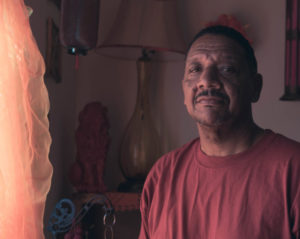 In 1993, the North Carolina State Bureau of Investigation examined rape kits from the victims that had been performed during the investigation, and discovered sperm in the youngest victim’s rectum and vagina—clear evidence that she’d been sexually assaulted at the time of the crime. At trial, however, then-Durham District Attorney Mike Nifong and the lead detective on the case, Darryl Dowdy, argued that no sexual assault had occurred. Rather, they said, the sperm indicated that the young girl was promiscuous.
In 1993, the North Carolina State Bureau of Investigation examined rape kits from the victims that had been performed during the investigation, and discovered sperm in the youngest victim’s rectum and vagina—clear evidence that she’d been sexually assaulted at the time of the crime. At trial, however, then-Durham District Attorney Mike Nifong and the lead detective on the case, Darryl Dowdy, argued that no sexual assault had occurred. Rather, they said, the sperm indicated that the young girl was promiscuous.
The truth was, if Nifong and Dowdy had conceded that sexual assault had occurred, it would have destroyed their case against Darryl, who had been excluded as the source of the sperm through DNA testing.
Ultimately, the crux of the state’s case rested on the testimony of several unreliable witnesses who gave inconsistent accounts that they’d seen Darryl threaten Washington shortly before she was murdered. Regardless of the unreliable information, Darryl was convicted of murder and arson and sentenced to 80 years in prison.
Based on the weak evidence that was presented at trial, but also based on who she knew Darryl to be, Nannie knew that Darryl had been wrongly convicted.
“I remember that one of the weekends soon after Darryl was sentenced, I scheduled a visit to see him.” explains Nannie. “When I saw him, I asked him point blank, ‘Did you do it?’ He said ‘No.’ I knew in my heart that he was being honest and that he wasn’t capable of something like that.”
But perhaps as important to Nannie as her intuition were facts that armed her with the truth. Prior to meeting with Darryl, Nannie tracked down two of the witnesses who’d testified against Darryl at trial.
“Even though I knew within my heart that he wasn’t capable of [doing] what they’d accused him of, I still needed to verify that in some way,” she explains.
Watch their anniversary video.
“I know they lied on you and I believe you”
“I don’t intimidate easily, but I’m a simple country girl. I remember thinking at the time that I was so out of my element. But I had a purpose and I was going to achieve my goal,” recalls Nannie.
The women told her that they’d lied in their testimony, one of them out of pressure from the prosecution. One of them even signed an affidavit that Nannie gave her, which stated that her testimony was fabricated.
“When I went to see Darryl [on that first visit], I told him ‘I know they lied on you and I believe you,’” she says. “I said, ‘I will stay with you until this is resolved.’ I wanted him to be free. I just didn’t think that it was fair that he would have to endure this alone. I made a promise to him on that day that I would be there for him until he was released.”
Darryl himself recalled the conversation in a 2014 interview with the Innocence Project in Print.
“She told me, ‘I’m not going to stop fighting this until you get out.’ And she worked on the case ever since. She’s a very special person.”
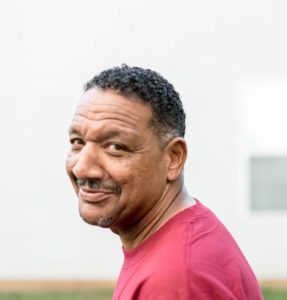 In the first years that Darryl was in prison, she and Darryl devised a plan to get help. They decided to reach out to as many lawyers as possible who could offer pro bono assistance. They believed that, surely, someone would see the blatant corruption in Darryl’s case and be compelled to argue for his freedom.
In the first years that Darryl was in prison, she and Darryl devised a plan to get help. They decided to reach out to as many lawyers as possible who could offer pro bono assistance. They believed that, surely, someone would see the blatant corruption in Darryl’s case and be compelled to argue for his freedom.
“That’s when the fighting started,” explained Darryl in 2014.
They wrote a letter detailing the case. Nannie mailed that letter to every law school in the country. And then they waited. Finally, in 2004, the Innocence Project took on the case.
Knowing that there was a legal team that was dedicating its time and resources to exposing the truth in Darryl’s case and winning back his freedom infused Nannie and Darryl with renewed hope. But their test was far from over. It would still take another 12 years of work before Darryl would eventually see justice. And during that time, there were other tragedies they would be forced to weather, such as the 2015 death of Darryl’s son to an apparent drug overdose.
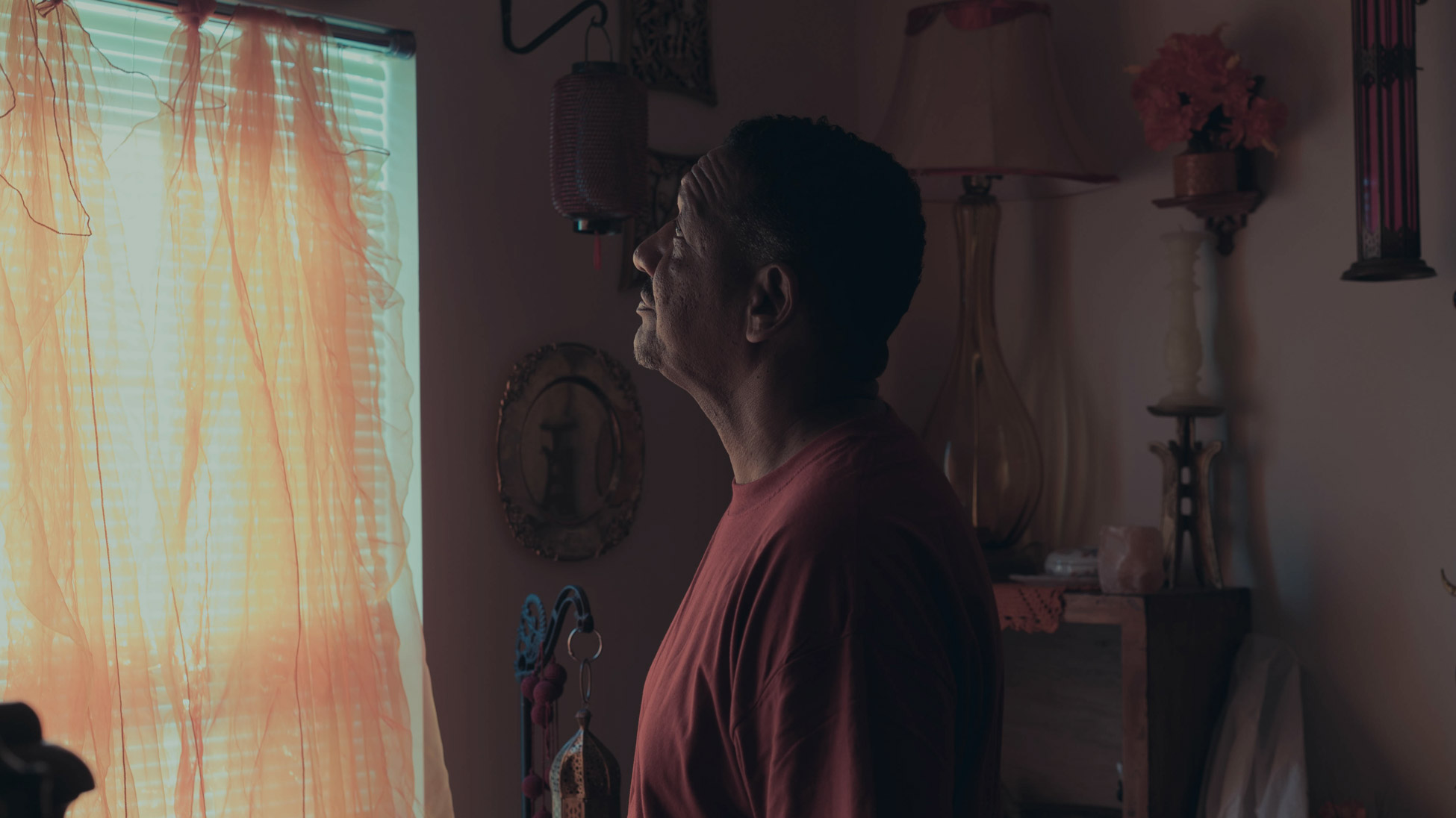
“My wife supports me. That’s the only thing that helps me. I think that without her, I would have gone crazy.”
“My wife supports me. That’s the only thing that helps me. I think that without her, I would have gone crazy.”
Darryl Howard Darryl at home. Photo: Sameer Abdel-Khalek.
According to Darryl, the only way that he survived all those years was Nannie.
Darryl said in 2014: “My wife supports me. That’s the only thing that helps me. I think that without her, I would have gone crazy.”
“I was his connection to the outside world,” Nannie explains.
For that reason, in the years that the Innocence Project worked on Darryl’s case, Nannie went to great lengths to take steps that would, as much as possible, draw them together as a couple and cause them to rely on one another.
That meant Nannie making every effort to see Darryl when she could. “I went out of my way to never miss a visit because it was important to him. And I had to see him,” she recalls. “The entire time that Darryl was incarcerated, I missed two to three visits.”
She was also very deliberate about incorporating Darryl, as much as possible, into her own life. In doing so, says Nannie, Darryl still played a meaningful role in their marriage.
“One of the things that anyone going through this has to realize is that you don’t stop living, but at the same time, you live your life as though you were a couple,” Nannie explains. “So you do things that you would normally do if your husband was standing by you or with you.”
Also, she says, regular communication was key. “Every decision that I thought would impact us then or in the future— because I knew we had a future together—I would discuss it with Darryl,” she explains. “I didn’t want him to think that I’d created a world that he did not exist in or that he only existed when I showed up to see him.”
At one point, she purchased a new home. Darryl was involved at every step of the process “At the end, I had paperwork drawn up. I went to the prison and got permission for him to sign all the documents,” she recounts. “And I remember giving him a key to the house because in my mind I thought, ‘This is my husband, he should have a house key.’”
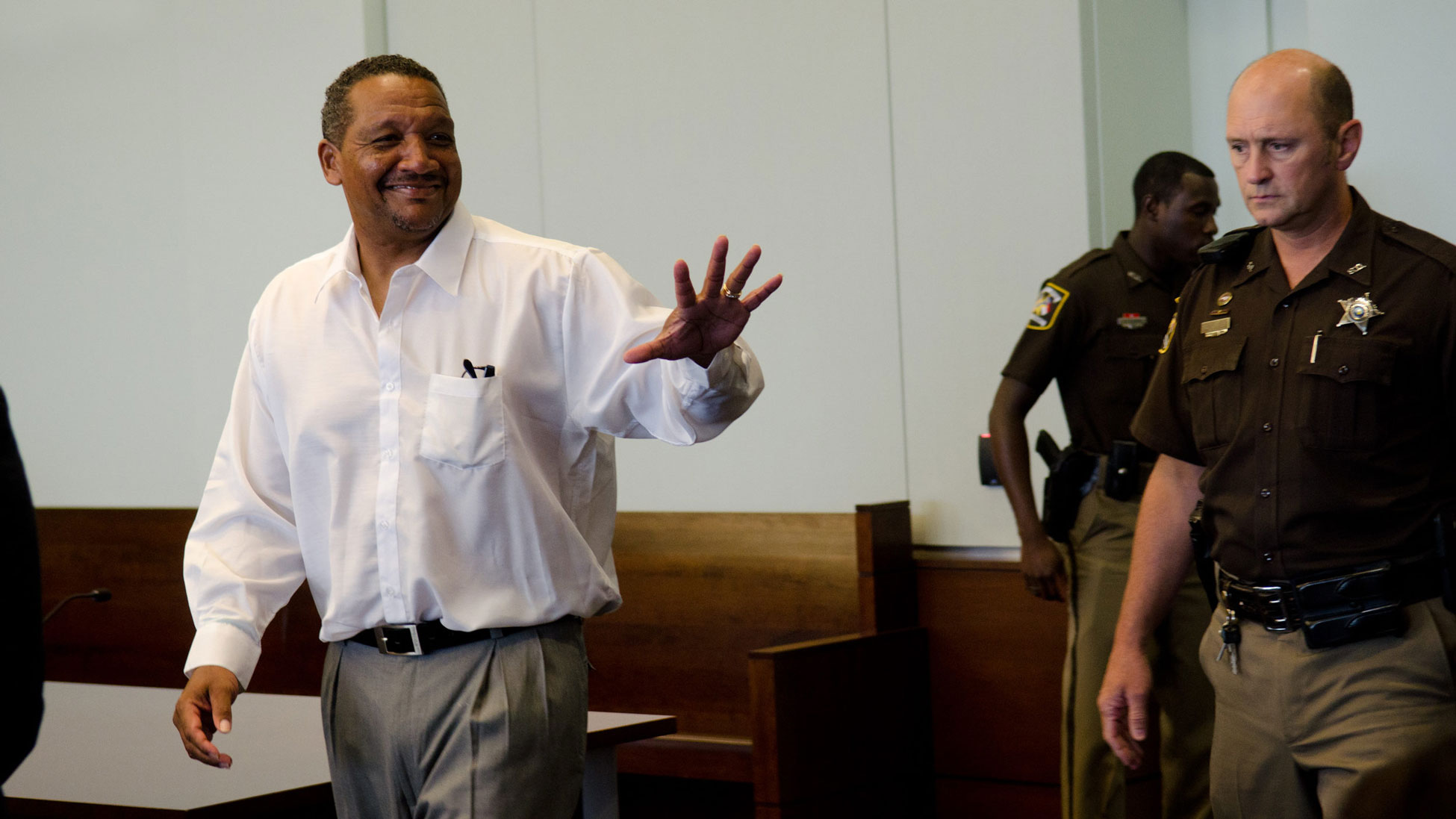
Darryl at a 2014 hearing in North Carolina. Photo: Sameer Abdel-Khalek.
Evidence excludes Howard
For years, the key functioned as only a symbol of what could be for both Darryl and Nannie, that is, until last summer. Finally, Darryl had his homecoming.
In August 2016, the Innocence Project went back to court in North Carolina for an evidentiary hearing to convince the court that Darryl should be released on bail. DNA testing from Doris Washington’s rape kit had excluded Howard and matched to a career criminal with over 35 prior convictions. Also, there was testing of the younger victim’s rape kit, which identified a second male profile that again excluded Howard.
Nannie stepped into the courtroom, ready for the fight ahead. “I had put my shields up. I was there to support Darryl and to let everyone know who was watching that he was not in this alone. I wanted to let them know that he was valued and that he was needed; that there are people—family—that want this man out,” she says.
Two days into what was supposed to be at least a three-day hearing, Darryl was released. North Carolina Superior Court Judge Orlando Hudson vacated Darryl’s convictions based on the new DNA evidence. Nannie describes her reaction in the courtroom as the judge announced his decision. “I didn’t take my eyes off of him because I wanted to let him see me and I wanted to see him because we did this. We fought so hard for this.”
Days after Darryl was released, prosecutors announced that they were dismissing all charges against him. He was fully exonerated.
18 years of marriage and counting
Nannie captured a photo of Darryl at the moment he received the news that they’d both waited so long to hear. In the picture, he is holding one hand over his mouth, suspended in disbelief.
Several weeks following the exoneration, Nannie and Darryl celebrated their 18th year wedding anniversary. Although they’ve been married for nearly two decades, it was the first time that they’ve ever been able to spend their anniversary together.
It’s now been almost six months since Darryl was exonerated. The newly reunited couple are doing their best to take their new life in stride.
Darryl has been working and in January was interviewing for a second job. Nannie herself has a busy work life, overseeing a division of Xerox at Duke University.
“Of course, the exoneration is hard. We’re still getting use to him being out. And there’s still a lot to do,” she says.
But Nannie isn’t afraid. The past 25 years are a testimony to that.
“Oh my God, we did it. We did it. Against the odds, against everything—we did this. We’re still together.”
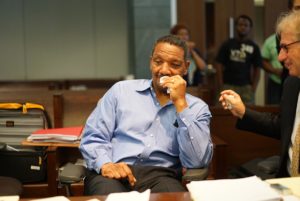
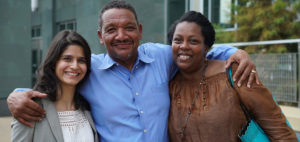
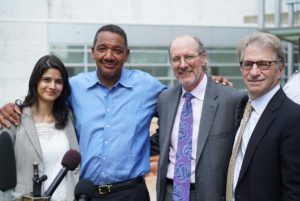
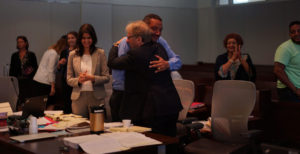
Leave a Reply
Thank you for visiting us. You can learn more about how we consider cases here. Please avoid sharing any personal information in the comments below and join us in making this a hate-speech free and safe space for everyone.